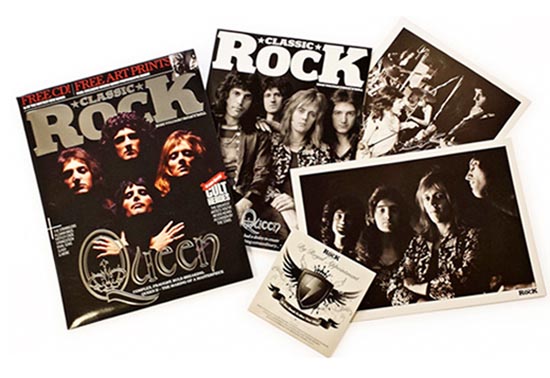Classic Rock April 2014 Issue 195

In Classic Rock April Issue 195:
Forty years ago, Queen released the album that would define their sound, capture their grand ambition and vindicate their unshakeable self-belief. We present the story of Queen II and the real birth of the legend. Plus we bring you a selection of previously unseen photographs of Queen from a session by Johnny Dewe Matthews in 1974.
Also featuring…
Augustines Their rock’n’roll is layered with biographical detail. Singer/guitarist Billy McCarthy talks about the songs and the life. The Stranglers After a 1990 split with their frontman, the band were written off. We look at their remarkable resurgence. Monster Truck Canada’s hottest new band. “People expect us to be wild, tough bikers, but we’re definitely not.” These guys were born to be mild.
Plus Bruce Springsteen, Mötley Crüe, The Who, Gene Simmons, Ronnie Dio, Ginger Wildheart, Myles Kennedy and more! Buy from newsagents from 26 February 2014 or ONLINE.
—
EXTRACT:
“For a long time it was my favourite Queen album. It got overtaken by Made In Heaven, which I think is, strangely enough, perhaps the deepest Queen album, because we did it after Freddie had gone, but I’ve always loved that record. In a sense it was the biggest jump we ever made creatively.”
It says something about Brian May that he seizes the phone so enthusiastically to begin talking about Queen II, a record he made more than half a lifetime ago. He has excused himself from one meeting, and has another to attend immediately afterwards. Cheerful, thoughtful and engaged by the subject, it is only the next morning that he will post on his blog (on which he can be as irascible in print as he is charming in person) that he had been waiting for a call from his specialist for the results of a series of tests for cancer. It would come at six that evening, and it brought the best kind of news. May, who lost his father to the disease at 66 – the same age that he is now – was given the all-clear; the pain in his lower back is something far less sinister.
For fans of Queen, a band trapped in the imagination as somehow ageless, their music a constant, their image maintained in perpetuity by their videos and concert films, it’s difficult to conceive of them becoming old. But even despite the electrified, eternally youthful glow of the baby-boomer generation, May and his bandmate Roger Taylor are mortal men, now in the middle of their seventh decades.
There is a distance now between them and the story that they have agreed to tell, and much has happened in between. When they speak about themselves during the making of Queen II, it’s with an amused detachment, almost as if they were discussing the antics of their teenage grandchildren. The details of any rabble-rousing misbehaviour have been lost to time, and probably discretion too. The act of hedonism that remains in the memory is the creative binge that allowed them to put down on tape the sounds that they had been carrying around in their heads since the concept of Queen became to them. All of their excess came out on the record; it was that, rather than sex, drugs and rock’n’roll madness, that consumed them and drove them forwards.
In its bombastically glorious sound, its sonic grandeur, its sometimes hilarious excesses, Queen II is the record that pointed the way to the band that they would become. From a cover shot in homage to Marlene Dietrich, to its themed sides of ‘White’ and ‘Black’, unfettered ambition runs through it. Forty years later, it retains a gobsmacking appeal. It really is quite something.
“I don’t think the album sounds like anyone else,” says Roger Taylor, sitting in a shaded corner of his studio on a bright winter’s day in deepest Surrey. “We weren’t really at that point like anyone else… we gained a mental identity, a group identity and we were just doing what we did.” Casually but expensively dressed, softly spoken and instinctively well mannered, it would be easy enough to mistake the drummer for the successful dental surgeon that in a more conventional life he would have become. Instead he has been Queen’s most conventional rock star: an androgynous beauty in his youth, it was Taylor who loved sports cars and dated models; who brought his rasping rock’n’roll voice to the many layers that would characterise Queen’s sound; who will say even now, after the decades of hit singles and chart success, that he considers Queen to be “an albums band”.
“I remember Queen II clearly because it was such a formative period,” he begins. “Things were just starting to crystalise. The first album was made very much in spare studio time. Queen II was more of a piece, rather than just being songs thrown on to an album, which is what the first one was. We were really starting to push the boundaries of the studio in terms of overdubbing, and what we could do vocally, which we were really just tinkering with before that. We really realised that we had a lot of vocal power, and things we could do with vocals. There was a lot of very complex stuff on there.”